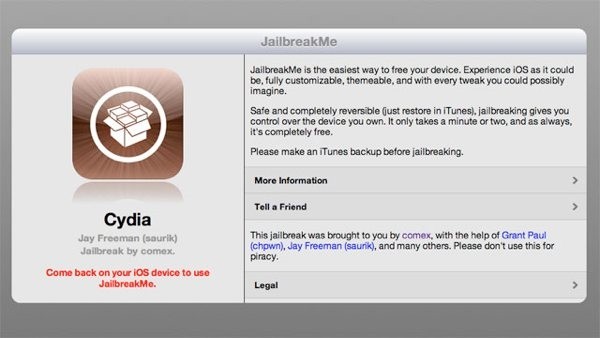JailbreakMe.com, the infamous browser-based iOS jailbreak service, has just been updated to version 3.0. The release is notable not only because it's the simplest jailbreak method around, but also because it will allow iPad 2 owners to install custom apps on their tablet for the first time since it was released back in March. What's more, it's an untethered jailbreak, which means that you won't lose the ability to run unofficial software if you reboot your device.
Whereas most jailbreaking tools require you to connect your device to a computer with a USB cable and run software from your desktop, JailbreakMe works over the Internet. The whole process is quite simple: just point the browser on your iOS device to JailbreakMe.com, then click on the Free / Install button as you would with any application on Apple's App Store. Within seconds your iOS device will be jailbroken and the Cydia Store app will appear on your home screen.

The browser-based jailbreak exploits a flaw in Apple's PDF renderer that allows the tool to open up the device. Theoretically this security hole could be exploited by others to run malicious software on iOS, but you can address this with an app called PDF Patcher 2 from the Cydia store after jailbreaking your device. Users of non-jailbroken iOS devices will have to wait until Apple provides a fix – which would also render the latest version of JailbreakMe useless.
Supported devices and configurations include the following:
- iPad 1 running iOS 4.3 through 4.3.3
- iPad 2 running iOS 4.3.3
- iPhone 3GS running iOS 4.3 through 4.3.3
- iPhone 4 running iOS 4.3 through 4.3.3
- Verizon/CDMA iPhone 4 running iOS 4.2.6 through 4.2.8
- iPod touch 3rd generation running iOS 4.3, 4.3.2 or 4.3.3
- iPod touch 4th generation running iOS 4.3 through 4.3.3
Needless to say you should backup your device before proceeding with the hack in case something goes wrong, and of course, be aware that jailbreaking voids your warranty with Apple. Although jailbreaking your smartphone is perfectly legal, thanks to a DMCA exemption introduced in 2010, the Cupertino company has warned users that unauthorized modifications can cause "instability, disruption of services, and compromised security."